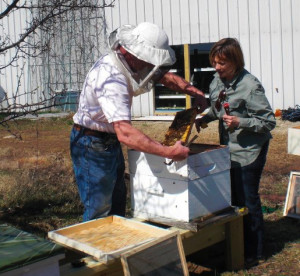
Toni & Paul, Working the bees
A few months ago, I gave you guys a sneak peak behind the scenes of my blossoming romance with apiculture, a.k.a. beekeeping. When I embarked upon my first long trek out to Fayetteville for an extra few hours of schooling once a week, for six weeks, I never imagined how hard I would fall in love with the beekeeping world. These little creatures are extraordinary. Their little microcosm is incredibly complex, working smoother than any well-oiled machine we humans create. Best part is, TS Designs has been sharing our premises with a busy little colony of bees for right around a year now. And boy do we love having them around.
Ladies & gentlemen, allow me to introduce to you our resident Beekeeper Extraordinaire, Toni Murray. She took a couple minutes out of her busy day to sit down and answer a few burning questions I had for her – questions you probably have too! Read on, friends.
Me (N): How did you first become interested in beekeeping?
Toni (T): I have been interested in sustainability issues for many years. My daughter Logan (who’s now away at college), and I attended a beekeeping workshop in Ohio many years ago. However, because of frequent career relocation we were unable to establish hives. We moved to Glencoe Mill Village, North Carolina in 2006 from Kentucky, with hopes of not having to move ever again! Early last year I noticed an announcement in the local paper for a 13-week beginner beekeeping course sponsored by the Alamance County Beekeeper’s Association. I not only registered myself, but also my daughter Sophia (then 13) and my best friend, Paul Jollay. The three of us attended the prescribed sessions and the hands-on field day. We took the optional tests (written and field) to become Certified Beekeepers through NC State’s Extension Program. The three of us passed the examination and are still keeping records of our work and experiences with beekeeping to submit for the next levels of certification with the program.
N: What are the most important benefits of keeping bees on the TS Designs premises?
T: It is a ‘win-win’ to have bees at TS Designs. The bees have nectar sources nearby that are not contaminated with spray/pesticides, thus their honey is purer for them and us! TSD has another piece of the permaculture puzzle to share with employees and visitors, in education and increased pollination of flowers and veggies. As an added bonus, Sophia, Paul and I have another location in which to study and learn from the bees as well as harvesting the honey. We appreciate the collaborative work we are able to do with TSD.
N: Have our bees struggled against any of the recent viral and parasitic scares that have been going on lately?
T: With the guidance of Don Hopkins, one of NC’s seven state bee inspectors, we have been proactive in managing the TSD hive in overcoming the health challenges that were facing the bees when we ‘inherited’ them late last summer. The bees survived the winter on their own stored honey, and with the hope of spring and warmer temperatures, look for the bees to be out and about working to build their hive with foraged nectar and pollen. The stronger the hive, the better the bees are at surviving the small hive beetle and the varroa mite that had weakened them last year.
N: What advice can you give to individuals or businesses who are considering (or have not yet considered) introducing apiculture to their repertoire?
T: Having bees available in your backyard or business puts you ‘up close and personal’ with livestock that are truly ‘life stock’. While enjoying the benefits of increased pollination and the honey harvest (as well as other hive products), the most amazing benefit of keeping a hive is the wonder and joy that comes from just slowing down to enjoy the bees themselves. It is easy to become mesmerized by seeing the tiny insects fly to the hive entrance with various colors of pollen on their legs. You join in the circle of life in a very intimate way.
N: What is your favorite part of spending time with our bees?
T: Along with Sophia and Paul, I have enjoyed the challenge of new academic material, reading research and journal articles about bee health and industry; remembering my basic biology and botany studies; learning how to assemble a hive; working together to remove a swarm from an old house; and, trying new recipes with honey as the sweetener. Most of all, I have appreciated the ongoing opportunity to learn the ‘trade’ from established beekeepers (our instructors have taught this course for 20 years!) while bringing my own understanding of nature and best practice to our beekeeping.
